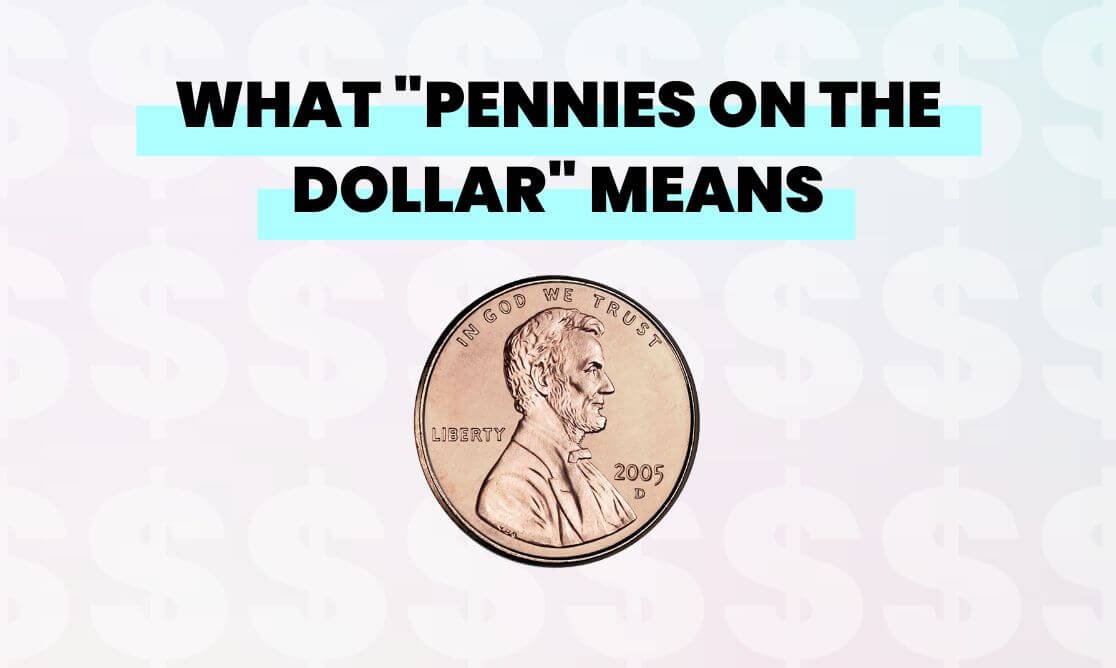The phrase "pennies on the dollar" is a common idiom used in business to convey the idea that an asset or a company is sold at a significantly reduced price, typically much lower than its intrinsic value.
Want to sound like you'd fit in around a boardroom table? Read on for an explanation of what it means in simple terms and when it's appropriate to use this phrase, complete with everyday examples to help you understand it better.

Coming up next
Key takeaways
- "Pennies on the dollar" refers to an asset or a company being sold for a fraction of its value.
- This expression is often used in the context of distressed assets, bankruptcies, or fire sales.
- Buyers who acquire assets for "pennies on the dollar" benefit from significant discounts.
- Buyers may also assume the liabilities associated with the asset or company.
When it makes sense to use this phrase
"Pennies on the dollar" is a common business idiom that means selling an asset or a company at a significantly lower price than its true value.
This expression is frequently used in distressed assets, bankruptcies, or fire sales situations.
These circumstances arise when there is an urgent need to sell assets quickly due to financial difficulties, and as a result, they are sold at a substantial discount compared to their actual worth.
Examples of this expression in use
- Bankruptcy sales. In cases where a company is undergoing bankruptcy proceedings, it may need to sell its assets to generate funds for paying off its creditors. These assets are often sold at a fraction of their actual value, resulting in the usage of the expression "pennies on the dollar." This phrase accurately portrays the substantial discount at which the assets are sold to settle financial obligations.
- Distressed property investments. Real estate developers or investors with a keen eye for opportunities may acquire distressed properties for "pennies on the dollar." These properties are typically in poor condition or facing financial difficulties. By purchasing such properties at a significant discount, the buyer can invest in renovations or improvements, aiming to enhance their value and subsequently sell them at a higher price. The phrase "pennies on the dollar" reflects the substantial discount achieved when purchasing distressed properties.
- Distressed debt investments. Hedge funds or investors specializing in distressed debt may acquire the bonds or debt instruments of struggling companies for "pennies on the dollar." By purchasing these debt instruments at a significant discount, the buyer anticipates a potential recovery or turnaround of the company. If the company successfully improves its financial situation, the value of the acquired debt may appreciate, resulting in a profitable investment. The usage of "pennies on the dollar" appropriately conveys the substantial discount achieved during the acquisition of distressed debt.
In popular culture
The phrase "pennies on the dollar" has become ingrained in popular culture, appearing in movies and TV shows. Here are some examples of its usage across different media:
- In the film "The Big Short," the main characters capitalize on the housing market's collapse by purchasing subprime mortgages for "pennies on the dollar." This strategic move allows them to profit significantly from the market downturn.
- The entrepreneurial show "Shark Tank" often features aspiring business owners pitching their ventures to investors such as Mark Cuban, Kevin O'Leary, Lori Greiner, Daymond John, and Barbara Corcoran. Some of the entrepreneurs offer equity in their companies for "pennies on the dollar" in exchange for financial backing and guidance from experienced investors.
- In the series "Pawn Stars," the main characters purchase items from customers for "pennies on the dollar" and subsequently resell them at a higher price, thereby making a profit.
Additionally, the phrase is also used in news articles and books.
- Warren Buffett, a widely recognized investor, is renowned for his ability to acquire undervalued companies for "pennies on the dollar." This approach has been instrumental in his successful investment career.
- "The Penny Pincher's Bible: Living Better for Less" is a book that offers advice on saving money. It demonstrates ways to make purchases for "pennies on the dollar," providing readers with insights on how to stretch their budgets effectively.
The use of "pennies on the dollar" in these various forms of media illustrates its widespread recognition and understanding as a concept associated with acquiring assets or bargains at significantly reduced prices.
Conclusion
In conclusion, "pennies on the dollar" refers to an asset or a company being sold for a fraction of its actual value, often in the context of distressed assets, bankruptcies, or fire sales. It is a term that makes sense when an asset or company is being sold at a significant discount, and the buyer may also assume the assets or company's liabilities.
It is crucial for buyers to be aware that acquiring assets for "pennies on the dollar" may also entail assuming associated liabilities. Before engaging in any investment opportunity, conducting thorough research, understanding the risks involved, and assessing the potential rewards are essential steps to make informed decisions.

